Alyson Marie Palmquist
Posts tagged with Accessibility
Showing 1 - 10 of 16 items
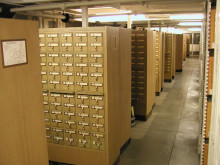
In 2023, the U-M Library conducted its first comprehensive survey across students and employees. This blog post covers my specific research exploring the experiences of people with disabilities in the libraries, and their struggles with accessibility by analyzing data from the campus-wide survey. The goal of this research was to reveal struggles people with disabilities are facing in the libraries. By improving the library spaces with accessibility in mind, everyone – not just those with disabilities – benefits.
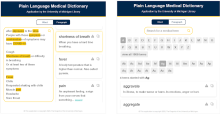
In 2024, updates to the Plain Language Medical Dictionary (PLMD) included big improvements for accessibility and user experience, plus adding support for images. We fixed contrast issues, unclear icons, and missing labels to meet WCAG 2.1. Search also got smoother, and instructions are now clearer. In addition, we added image support with JSON updates for URLs and alt text. With our legacy hosting environment shutting down, we moved the PLMD moved to GitHub Pages as part of the project. This provides better stability and automatic updates via GitHub Actions.

As part of a broader product accessibility initiative in Library Information Technology, the team behind the library’s website undertook a number of remediation efforts based on the findings of the site’s baseline accessibility evaluation. The work demonstrates how accessibility remediation can also be an opportunity for code clean-up, usability improvements, and refreshing design elements.
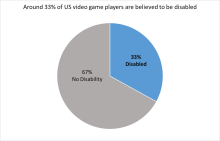
CVGA student resident Joseph Heger makes a plea for better integration of adaptive technology and options in major game releases.
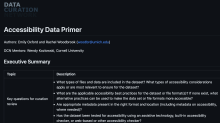
One of the main activities the Deep Blue Repository & Research Data Services team conducts is data curation(1)--that is, actions that provide meaningful and enduring access to data. The accessibility of research data has been an under-discussed phenomenon in the field of research data management, but we are excited to announce the release of a new resource intended to help curators as well as researchers approach the release of research data with the goal of maximizing accessibility--in particular for those with disabilities, neurodivergence, and/or who use assistive technologies.
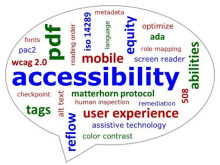
The Accessibility Remediation Team was created to serve as a resource for students, faculty, and staff when they needed more accessible library content. Beginning in the Fall 2020 we identified tools and processes to use in remediating video, audio, and PDFs for accessibility. As part of our service, we focused on assessment, gathering feedback through ‘exit’ surveys of colleagues and patrons, and using project management tools to gauge the amount of time tasks take to complete.
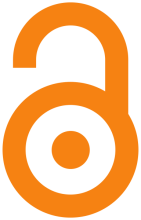
When I applied to the Michigan Library Scholars program to work for the “A Survey of Global Open Access Policies” project, I took it as an opportunity to learn more about a particular side of publishing and law that I didn’t know much about. As someone who is double majoring in Political Science and Creative Writing & Literature, I have always been interested in how the law interacts with people’s creations — regardless of whether those creations are novels, pieces of artwork, or video games. For some reason, though, I’d never considered works of research under the same umbrella. Through this project, I’ve learned about the importance of open access policies and how they fuel innovation and generate new knowledge.
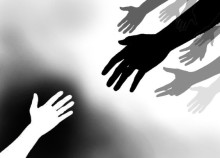
The Michigan Library Scholars application jumped out at me back in February. I’m a rising junior studying economics & communications with a minor in Spanish, hoping to ultimately work for a non-profit one day. I saw the Askwith project and was immediately drawn to it because the majority of my classes this past semester were on globalization. Slowly I began to understand the necessity of being culturally aware and maintaining diversity in a world where homogeneity is often expected. Knowing I had been confined to my own “single-story,” or was truly only familiar with my home country, became an impediment to my perspective on the global community. The MLS program stood out to me then, and now, because I got to be part of a team of classmates and mentors working to end narrow-mindedness at UM.
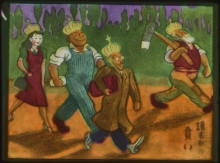
Dorothy Ma's Final Reflection Blog Post for the 2019 Michigan Scholars Program, the Increasing Accessibility to Digital Image Collections in Japanese Studies project.
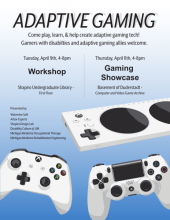
Interested in creating adaptive and accessible video game technology? Looking to learn which video games are the best of the best when it comes to accessibility? Just looking to game? The library is hosting two accessible and adaptive gaming events in April! The CVGA is also working to add more accessible and adaptive gaming equipment to its collection.